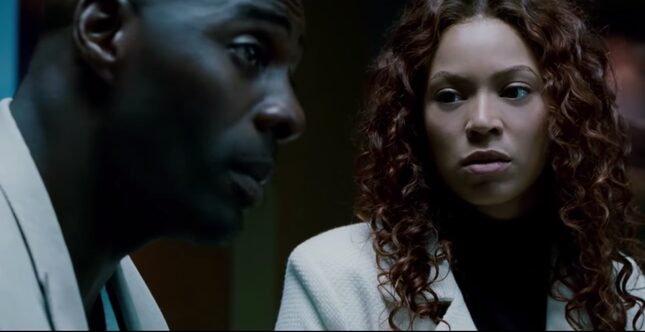
On April 24, Beyoncé Giselle Knowles-Carter’s filmic magnum opus celebrates its 10th anniversary. Said magnum opus isn’t her self-titled album or the critically acclaimed Lemonade, or even the Oscar-winning Dreamgirls, but a tiny 2009 film titled Obsessed, added to Netflix this month. A ridiculous movie that might have been lost to the annals of history if Beyoncé never became BEYONCÉ, Obsessed doesn’t really hold up in the slightest, but its impact is large. In addition to giving us the most often quoted phone call in the world, it also ushered in a slate of middling thrillers with black casts, all of which are iconic in their mediocrity.
Obsessed is an objectively bad movie. The pacing is odd, Elba’s character Derek continuously makes inexplicably poor choices, Beyoncé’s role as his much younger wife Sharon is paper thin and seems to exist only for the final, bloody confrontation, and Larter’s Lisa may be the single most deranged and problematic depiction of a woman scorned since 1987’s Fatal Attraction. And yet despite all that, it’s still fun as hell. Beyoncé’s Texas twang is in full swing, her line readings are terrible, and Elba’s beardlessness and abysmal suiting makes it hard to believe he’d eventually be named the sexiest man alive. The soundtrack is intrusive and dated in the way contemporary pop music always is, but the classic thriller score is deliciously ham-fisted. Who doesn’t want to see Beyoncé make the precedent setting choice to passive-aggressively call a white woman by the wrong name as punishment for flirting with her husband? And we haven’t even gotten to Jerry O’Connell’s ridiculous mix of pervy encouragement and genuine concern as Elba’s coworker Ben.
Who doesn’t want to see Beyoncé make the precedent setting choice to passive-aggressively call a white woman by the wrong name as punishment for flirting with her husband?
Terrible as it was, Obsessed set the stage for the black thrillers that have continued to pop up in regular intervals since the movie’s 2009 release. The plots of these films tend to be paper thin after-thoughts that place black (heterosexual) couples in opposition to an outside antagonist, usually with a focus on the interiority of the black woman and the struggles she faces, up to and including the inciting incident. Whether it’s Gabrielle Union fending off home invaders in 2018’s Breaking In or Sharon Leal being stalked by the lover she took during the throes of her sex addiction in 2014’s Addicted, this hyper-specific genre is chock full of scenarios that put black women in the role of both the damsel in distress and the righteous wronged heroine, often allowing them to save themselves, as in 2014’s No Good Deed and 2015’s The Perfect Guy. Part of what makes them so enjoyable is that they present a universe in which black women nearly always maintain the moral high ground; there is no disputing that our sympathies as an audience should lie with them. They’re a welcome, if imperfect respite in an entertainment landscape where black women are still too often relegated to the role of best friend to the white lead. Black thrillers center black women and black families in a way that is still rare to see in other, less niche genres.
Obsessed is Beyoncé’s last live-action, non-documentary film appearance to date and is the only role in which she does not perform (though music from her third album I Am… Sasha Fierce plays over the credits). Just 27 years old at the time of release and another four years from cementing herself as a living musical legend with the surprise drop of her self-titled album, the movie was clearly Beyoncé’s attempt to branch out into more serious fare and position herself as a “proper actress.” Her father and former manager Matthew Knowles is credited as a producer. Playing opposite up and comer Idris Elba, who at the time had had most of his credits in television, it’s obvious in hindsight that the film was meant to act as a proving ground for the fabulous diva who could command a stage but had little formal acting training. It’s little wonder that Obsessed is the film that spawned the “Beyonce can’t act” meme despite having turned in more than serviceable performances in Dreamgirls and Cadillac Records respectively. It was the first time her narrative didn’t center on music, and without the opportunity to embody Sasha Fierce, her appearance was admittedly lackluster.
Though Beyonce may not have managed to have her A Star Is Born moment just yet, her impact as always is in felt in the legacy she leaves in her wake. Because of Obsessed’s commercial success, black actresses have been able to retain amide-budget arena they can use to prove their skills and staying power without the pressure of a multi-billion dollar release. It’s a trend that I hope never dies, and The Intruder is next in line.
Cate Young (@battymamzelle): smugsexual, thundercunt hagbeast.